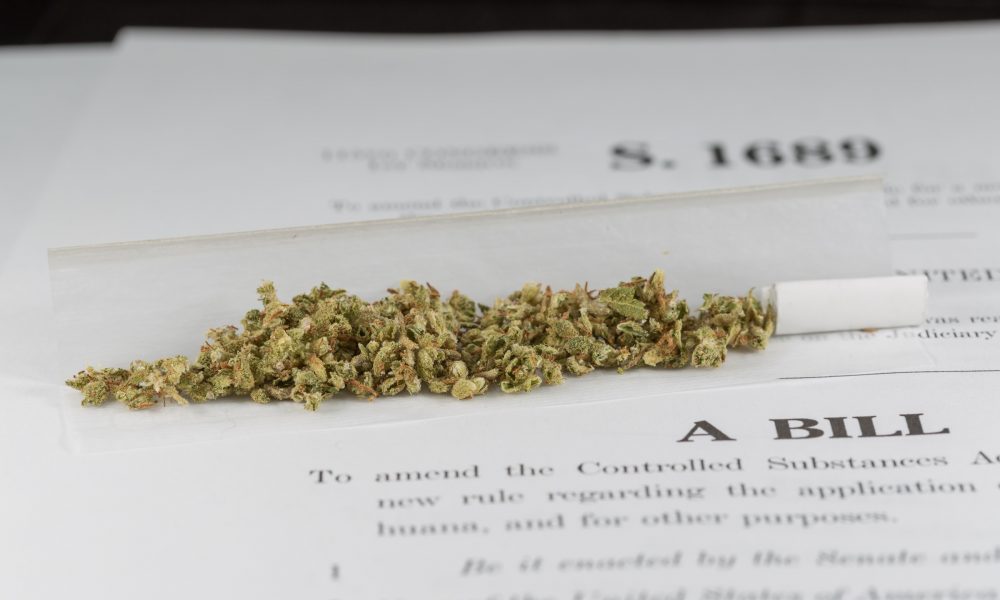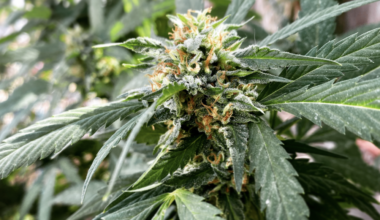The first draft of a long-anticipated Senate bill to federally legalize marijuana has been released—and its sponsors are asking for public input to further improve the legislation before it is formally introduced.
Senate Majority Leader Chuck Schumer (D-NY), Senate Finance Committee Chairman Ron Wyden (D-OR) and Sen. Cory Booker (D-NJ) are unveiling the draft at a press conference on Wednesday. It’s an extensive bill, titled the Cannabis Administration and Opportunity Act, that weighs in at 163 pages.
The main features of the legislation largely align with what advocates and stakeholders expected. It would federally deschedule cannabis, expunge prior convictions, allow people to petition for resentencing, maintain the authority of states to set their own marijuana policies and remove collateral consequences like immigration-related penalties for people who’ve been criminalized over the plant.
“Cannabis prohibition, a key pillar of the failed war on drugs, has caused substantial harm to our communities and small businesses, and especially for communities of color,” Wyden said. “It’s as simple as this: Senators Booker, Schumer and I want to bring common sense to the federal government, end prohibition and restore the lives of those hurt most and set them up for opportunity.”
The bill would also impose a federal tax on marijuana products and put some of that revenue toward grant programs meant to support people from communities most impacted by prohibition who want to participate in the industry.
Further, the legislation would transfer regulatory authority over cannabis from the Drug Enforcement Administration (DEA) to the Food and Drug Administration (FDA), the Bureau of Alcohol, Tobacco, Firearms and Explosives (ATF) and the Alcohol and Tobacco Tax and Trade Bureau (TTB).
There’s a lot of ground to cover on the proposal. And while the senators are confident that it addresses key concerns from stakeholders, advocates, public health officials and law enforcement alike, they recognize that this is not the final form the bill will take. To that end, a public comment period is open until September 1.
“The War on Drugs has been a war on people—particularly people of color. The Cannabis Administration and Opportunity Act aims to end the decades of harm inflicted on communities of color by removing cannabis from the federal list of controlled substances and empowering states to implement their own cannabis laws,” the senators said in a summary of the bill that was shared with Marijuana Moment. “Descheduling cannabis is a critical step towards achieving justice for those targeted and hard hit by the War on Drugs. But that alone is not enough.”
The bill is multifaceted and deals with a large number of complex issues that have arisen under the umbrella of federal prohibition.
The basic components
Perhaps the most immediately consequential provision would be a requirement that the attorney general to remove marijuana from the Controlled Substances Act within 60 days of the bill’s enactment.
But it’s important to keep in mind that this legislation—like other federal legalization bills moving through Congress—would not make it so marijuana is legal in every state. The proposal specifically preserves the right of states to maintain prohibition if they way. It stipulates, for example, that shipping marijuana into a state where the plant is prohibited would still be federally illegal.
However, the measure would make it clear that states can’t stop businesses from transporting cannabis products across their borders to other states where the plant is permitted.
FDA would be “recognized as the primary federal regulatory authority with respect to the manufacture and marketing of cannabis products, including requirements related to minimum national good manufacturing practice, product standards, registration and listing, and labeling information related to ingredients and directions for use,” according to the summary.
Meanwhile, TTB would have jurisdiction over marijuana tax and trade practices. That would include cannabis tax revenue collection, tax law enforcement and tracking and tracing of marijuana products.
“The agencies would have dual jurisdiction related to certain aspects of cannabis product labeling and packaging, advertising, and other consumer information,” the document says.
Social equity
As promised, the senators are including language into the bill that would promote social justice for those who’ve been disproportionately impacted by the war on drugs.
“Communities that have been most harmed by cannabis prohibition are benefitting the least from the legal marijuana marketplace,” the findings section of the bill says, noting that a “legacy of racial and ethnic injustices, compounded by the disproportionate collateral consequences of 80 years of cannabis prohibition enforcement, now limits participation in the industry.”
“Historically disproportionate arrest and conviction rates make it particularly difficult for people of color to enter the legal cannabis market- place, as most States bar these individuals from participating,” it says.
A key barrier for such individuals is that fact that people from communities of color have been most targeted by cannabis criminalization, despite the fact that use is comparable across races. The bill seeks to repair that harm by mandating each federal district to expunge arrests and convictions for non-violent marijuana offenses within one year, and it also allows people who are still under a criminal sentence for cannabis to obtain a resentencing review hearing.
Grants
There would be three grant programs established under the bill.
One would “fund nonprofits that provide services to individuals adversely impacted by the War on Drugs, such as job training, reentry services and legal aid, among other services,” according to the summary. It would be distributed through a new Cannabis Justice Office under the Justice Department.
Another would “provide funding to eligible states and localities to make loans to assist small businesses in the cannabis industry owned by socially and economically disadvantaged individuals” through the Small Business Administration (SBA).
Finally, the Equitable Licensing Grant Program would “provide funding to eligible states and localities to implement cannabis licensing programs that minimize barriers for individuals adversely affected by the War on Drugs.”
“To be eligible for these SBA grants, states and localities must take steps to create an automatic process to expunge criminal records for cannabis offenses and violations for individuals under criminal supervision for cannabis offenses,” the summary says.
Consumers’ rights
People could not be denied federal benefits due to the use or possession of marijuana or for a conviction for a cannabis offense. That includes preventing the revocation of security clearances for federal employees.
However, one component of the new bill that advocates have taken issue with—which has been previously included in past reform legislation—would let agencies “continue to include cannabis for purposes of drug testing of Federal employees.”
Additionally, the measure would authorize physicians with the U.S. Department of Veterans Affairs (VA) to issue recommendations for medical cannabis to veterans. That’s another topic that’s been the focus of separate, standalone legislation in recent sessions.
—
Marijuana Moment is already tracking more than 1,100 cannabis, psychedelics and drug policy bills in state legislatures and Congress this year. Patreon supporters pledging at least $25/month get access to our interactive maps, charts and hearing calendar so they don’t miss any developments.![]()
Learn more about our marijuana bill tracker and become a supporter on Patreon to get access.
—
Taxes and permits
A gradual federal tax rate would be imposed on marijuana sales, starting at 10 percent for the first year after the bill’s enactment and the first, subsequent calendar year. Then it would be increased annually, rising from 15 percent to 20 percent to 25 percent. Starting in the fifth year post-enactment, the tax would be a “per-ounce or per-milligram of THC amount determined by the Secretary of the Treasury equal to 25 percent of the prevailing price of cannabis sold in the United States in the prior year.”
In an effort to support small cannabis enterprises, the legislation says that “small cannabis producers with less than $20 million in sales annually would be eligible for a 50 percent reduction in their tax rate, via a tax credit.”
“Producers with more than $20 million in sales would be eligible for a tax credit on their first $20 million of cannabis sold annually, with sales above that amount subject to tax at the full rate. Similar to the reduced rates for alcohol producers, certain anti-abuse rules would limit the tax benefit only to products produced or substantially modified by the small producer, in order to limit the benefit received by large producers and to prevent a double-benefit.”
The legislation also lays out a structure for how marijuana businesses will be approved and regulated. For example, companies selling taxable marijuana products, or cannabis at the wholesale level, would require Treasury Department approval. Marijuana producers would further need to be registered with FDA.
A cannabis permit “may be denied or revoked if the premises is inadequate to prevent tax evasion or diversion, operation of the premises do not comply with federal or state law, or an applicant fails to disclose material information or makes a false statement,” the summary says. “In addition, a cannabis permit application may be denied if the applicant has been convicted of a disqualifying offense.”
“For these purposes, a disqualifying offense is a felony criminal offense that occurred after enactment of this Act and within the preceding three years related to cannabis diversion or cannabis tax evasion. An applicant may apply to the Cannabis Products Advisory Committee for a waiver with respect to a disqualifying offense if the Committee finds that the applicant has established sufficient evidence of mitigation or rehabilitation and fitness to maintain cannabis operations in compliance with state and federal law.”
FDA would have “authority over cannabis products in intrastate commerce,” the summary says. Under the agency, a new Center for Cannabis Products and a Cannabis Products Regulatory Advisory Committee would be created.
Cannabis products would not be regulated as dietary supplements, but the bill would “authorize manufacturers of cannabis products to make claims about the benefits of their products in the same manner that manufacturers of dietary supplements do today.”
It would, however, stipulate the FDA must create a regulatory pathway for CBD to be marketed as a dietary supplement.
The bill would further require “owners and operators of establishments that are engaged in the manufacture, preparation, compounding, or processing of a cannabis product to register their establishments with FDA upon first engaging in such activities and annually thereafter.” The agency would “issue regulations pertaining to distribution of cannabis products and good manufacturing practice.”
Another provision would mandate that FDA create a program to “expedite the development and review of applications for drugs containing cannabis that are manufactured by a small businesses owned and controlled by socially and economically disadvantaged individuals that operate in the cannabis industry.”
Under the legislation, the Treasury secretary would be compelled to establish a track-and-trace regime to prevent illicit distribution of cannabis products. And the official would also be mandated to start a program to facilitate “the lawful delivery of hemp that inadvertently exceeds the permissible THC limitations for hemp to a permitted cannabis enterprise for the proper processing of such products.”
The Consumer Product Safety Commission would be authorized to issue regulations setting standards for special packaging of cannabis products.
Federal law would be amended to explicitly state that SBA programs and services available to marijuana businesses and companies that work with them.
Although the bill does not specifically mention banking, its provisions ending the federal prohibition of marijuana would automatically remove any penalties that financial institutions currently potentially face as a result of working with licensed cannabis businesses because those operations would no longer be federally illegal.
Federal studies
The bill further directs the Government Accountability Office (GAO) to facilitate a number of studies into marijuana policy.
The office must conduct a “review of federal laws, regulations, and policies, to identify additional areas in need of change, including a study on replacing the term ‘marijuana’ and ‘marihuana’ with ‘cannabis’ through the U.S. Code and regulations,” the summary says. It must also study the demographics of those with federal cannabis convictions.
GAO would also have to evaluate the “societal impact of legalization” in states with recreational marijuana laws on the books.
Additionally, the Bureau of Labor Statistics (BLS) would need to compile demographic data on “business owners and employees in the cannabis industry.” Those figures could help inform social justice efforts, as there’s been widespread criticism of the industry over a lack of diversity despite advocates’ push for equity.
The U.S. Department of Health and Human Services (HHS) would be required to work with the National Institutes of Health (NIH) on ways to promote research into cannabis impacts. And meanwhile, HHS would be mandated to collaborate with the U.S. Department of Transportation (DOT) on data collection for marijuana-impaired driving while also supporting research into “an impairment standard for driving under the influence of cannabis.”
More details
The senators’ bill would establish a federal standard to make it so only those 21 and older can purchase recreational marijuana products. Each state that currently allows adult-use cannabis maintains that age restriction.
In order to reduce illegal diversion, the legislation would cap cannabis sales, stating that adults could only buy up to 10 ounces at a time.
Vaping delivery system products that contain added natural or artificial flavors would be banned under the proposal.
A newly created definition of “cannabis” would be created under federal law, but it would retain the exception for hemp that now exists.
The senators want feedback on the draft bill
Here’s an overview of some of the main points that the are seeking comment on:
-Measuring the potency of cannabis products, the overlap of definitions for hemp and marijuana, regulations for synthetic THC, regulatory responsibilities for various federal agencies and FDA funding.
-Coordinating federal and state law enforcement responsibilities for cannabis, state “primacy regarding cannabis regulation” and interstate commerce.
-Balancing efforts to reduce barriers to entry to the marijuana industry while mitigating the influence of illicit cannabis operators.
-Determining whether cannabis products should go through a premarket review before being marketed.
-How to deal with international treaty obligations with respect to marijuana.
Interested parties are encouraged to submit comments on these and other issues to [email protected] by September 1.
The bill has been highly anticipated
Advocates have been anxiously awaiting this legislation, which Schumer has repeatedly said was coming “soon” after he, Wyden and Booker first pledged in February that it would be ready “in the early part of this year.”
Since then, the majority leader has been making the case for reform everywhere from the Senate floor on 4/20 to a cannabis rally in New York City.
The three senators formally started their efforts on the legalization bill by holding a meeting earlier this year with representatives from a variety of advocacy groups to gain feedback on the best approach to the reform.
Schumer made a point in March to say that it will specifically seek to restrict the ability of large alcohol and tobacco companies to overtake the industry. Instead, it will prioritize small businesses, particularly those owned by people from communities most impacted by prohibition, and focus on “justice, justice, justice—as well as freedom,” he said.
He also urged voters to reach out to their congressional representatives and tell them that “this is long overdue.”
Activists are encouraged by the introduction of the lengthy and detailed proposal.
“The days of federal prohibition are numbered,” NORML Executive Director Erik Altieri said in a press release. “These actions by Senate Majority Leader Schumer and Senators Booker and Wyden reflect the fact that the supermajority of Americans are demanding that Congress take action to end the cruel and senseless policy of federal prohibition.”
“It is time for legislators to comport federal law with the laws of the growing number of states that have legalized the plant, and it is time for lawmakers to facilitate a federal structure that allows for cannabis commerce so that responsible consumers can obtain high-quality, low-cost cannabis grown right here in America without fear of arrest and incarceration,” he said.
Shaleen Title, CEO of the Parabola Center, said that the bill’s filing “sends a clear signal to the states to keep making progress on cannabis policy.”
“We’re encouraged by the senators’ inclusive process and intend to join other equity advocates in offering ways for the federal government to protect and build on the states’ progress toward social justice in cannabis policy,” she said. “Millions of people fought for an end to prohibition. We see this as an opportunity to stop the arrests and to shape the national marketplace for legal marijuana to be open to all, not just a wealthy few.”
Meanwhile, a separate House bill to federally legalize marijuana and promote social equity in the industry was reintroduced in May.
The legislation, sponsored by Judiciary Committee Chairman Jerrold Nadler (D-NY), was filed with a number of changes compared to the version that was approved by the chamber last year.
The Marijuana Opportunity, Reinvestment and Expungement (MORE) Act passed the House but did not advance in the Senate under GOP control. But this time around, advocates are optimistic that the policy change could be enacted now that Democrats run both chambers and the White House, and as more states are moving to enact legalization.
President Joe Biden, however, is an outlier within the Democratic Party, maintaining an opposition to adult-use legalization despite the widespread and increasingly bipartisan public popularity of the reform. It remains to be seen whether the president—who campaigned on more modest pledges to decriminalize cannabis possession, expunge prior records and respect state legalization laws—would stand in the way of a comprehensive policy change by threatening to veto the bill that’s ultimately produced.
Wyden, who under the chamber’s new Democratic majority assumed the top spot on the Senate Finance Committee—where the new legislation is likely to be referred once formally introduced—recently said his goal will be to “end the prohibition and come up with sensible tax and regulatory oversight at the federal level.”
He said in February that “it’s not enough in my view to just end cannabis prohibition,” and “I think we need to restore the lives of people who’ve been hurt most by the failed war on drugs and especially black Americans.”
All three senators—Schumer, Wyden and Booker—have in past years introduced marijuana legalization bills that never got hearings or votes.
Separately, a proposal to federally deschedule marijuana that does not include social equity components was recently filed by a pair of Republican congressmen.
Read the full text of the new federal marijuana legalization bill below:
Cannabis Administration and… by Marijuana Moment
Photo courtesy of Mike Latimer.
Medical Disclaimer:
The information provided in these blog posts is intended for general informational and educational purposes only. It is not a substitute for professional medical advice, diagnosis, or treatment. Always seek the advice of your physician or other qualified healthcare provider with any questions you may have regarding a medical condition. The use of any information provided in these blog posts is solely at your own risk. The authors and the website do not recommend or endorse any specific products, treatments, or procedures mentioned. Reliance on any information in these blog posts is solely at your own discretion.







